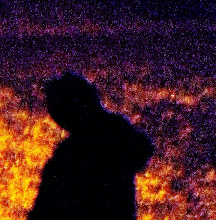So, on trust and relationships, and the most basic thing connecting the two that I can think of—this begins with an anecdote, as do many such ideas. You see, today, I was talking to my friend and boss—and my other boss. I had a pocketful of pens, which had been my reason for going out, and my friend was ‘breaking them in,’ because he is a bit of an artist and, like many creative-minded people, cannot resist an assortment of artistic tools. And they are pretty nice pens, and there were a few different colors. Anyway, the conversation went in a few different directions, and stuff, and the manager wound up making some snide side comment about my friend having too much power over me.
So I was thinking about it. This conversation doesn't have too much to do with the post, but it has enough to get me thinking--and it sparked this chain of thought that I’ve had in the back of my mind for years.
All relationships—at least, all positive relationships—are founded on trust. You cannot be friends with someone without granting them a measure of trust. As your friendship grows and you grow closer, the measure of trust grows as well. Obviously, this is just as important with romantic relationships as it is with platonic, but I don’t think it’s more important with either, just as both are necessary. (Our society tends to place romantic relationships on a much higher level, concerning importance, than any platonic relationships, and this bothers me. But that’s another topic for another day.) But anyway, the point is that in order to have a relationship with someone, you must trust them, with something. To have a closer relationship with someone, you trust them with more.
As a friend grows closer, especially when you’re growing up together—but any age, really—you begin to tell them more. At first, it’s only small things. Common interests, hobbies, small things you share with many people. Then, as you find them worthy of this trust and you begin to care more for them, the relationship grows. You begin to talk about deeper things, things important to you—things that matter, things that you care about. They do the same, and the trust and bond grow stronger. As the friendship grows, so does the trust between you.
Here’s the tricky part. Trust grants power. When someone learns something about you, it grants them a measure of power over you. In my mind, this makes the point of trust even stronger, more fundamentally important. It is the trust you grant in people. When you tell your friend about that new crush you have on him or her, you’re not only trusting that they won’t tell anyone, but you’re trusting them with a measure of power over you. This is the key to my revelation: The more people know about you, the more power they have over you. Every piece of information about yourself, no matter how trivial, is a chink in your mask, something that makes you vulnerable. Friends can use this against you. They won’t, because you are friends—likely as not, you have that same power. But it’s not an alliance; it’s not about keeping the secrets, maintaining the friendship, because you have an edge on each other. That’s what makes it friendship. You trust them not to hurt you with the power you grant them. The more you trust them, the more power they have over you. But you don’t care, because you care about them, and you know that they are worthy of your trust.
The above conversation excerpt isn’t really an example of this theme. It’s just the spark that led to this train of thought. But it still stands. The more you trust someone—for instance, trusting a friend’s word without question—the more power they have over you. That’s a scary thought, if you think about it. Think how many friends you have whose word you trust. Every friend, every loved one, ever person who you’ve given access to the person behind your mask, has a measure of power over you, has a way to hurt you.
Then think about why you gave them that power, whether or not you meant to. The deeper example, the more true example, for me, is something that happened a while ago. Someone surprised me online with this quote: “And I also know how important it is in life not necessarily to be strong but to feel strong, to measure yourself at least once, to find yourself at least once in the most ancient of human conditions, facing blind, deaf stone alone, with nothing to help you but your own hands and your own head” And didn’t tell me who they were. We talked for a long time, about society, the wilderness, the way civilization has turned its back on the reality of life, etc.
Through that one conversation, without even knowing who he was, I gave him more power over me than many of my friends have. But sometimes, it’s necessary, to drop the mask as far as you can and bare your open, beating heart to the winds of the world, and the searing life around you.
I’ll close with this, my most well-worn quote, from C. S. Lewis, which sums this up pretty well.
“To love at all is to be vulnerable. Love anything, and your heart will certainly be wrung and possibly broken. If you want to make sure of keeping it intact, you must give your heart to no one, not even to an animal. Wrap it carefully round with hobbies and little luxuries; avoid all entanglements; lock it up safe in the casket or coffin of your selfishness. But in that casket- safe, dark, motionless, airless--it will change. It will not be broken; it will become unbreakable, impenetrable, irredeemable.”
Subscribe to:
Post Comments (Atom)

No comments:
Post a Comment